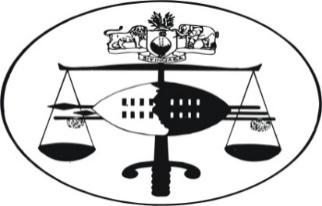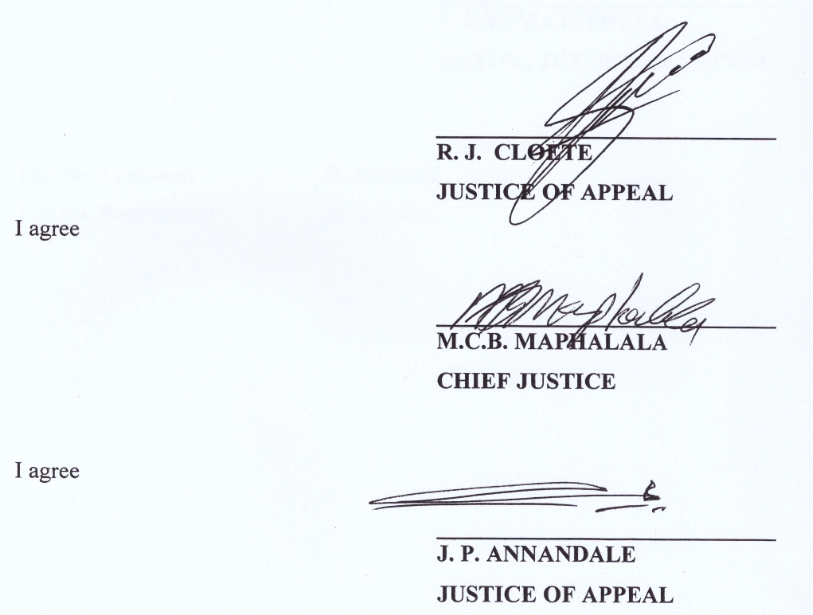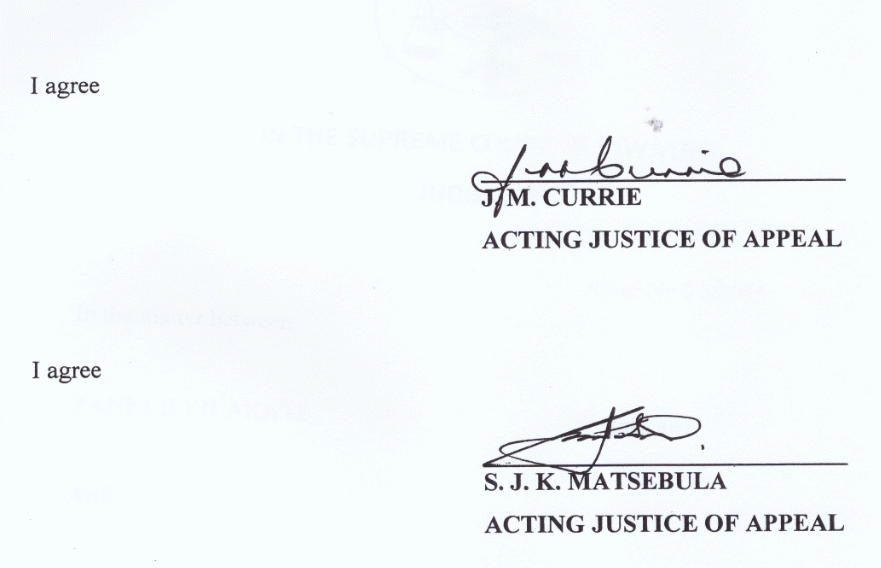- Case summary
- Condonation application granted Application for review in terms of Section 148(2) of Constitution – Attempt to introduce a document into record which is unauthorised and not dealt within the trial Court or this Court in its appellate jurisdiction – Unauthorised document ignored for purposes of judgment – Provisions of Section 29 (3) of the Constitution raised – Not applicable to the matter – Applicant failed to raise any exceptional circumstances – President Street Properties dictum confirmed – Application dismissed – Conviction and sentence confirmed.
16

IN THE SUPREME COURT OF ESWATINI
JUDGMENT
Case No. 27/2015
In the matter between:
ZANELE VILAKATI Applicant
and
REX Respondent
Neutral Citation : Zanele Vilakati vs REX (27/2015) [2018] SZSC 20
(26/09/2018)
Coram: M.C.B. MAPHALALA CJ, R.J. CLOETE JA, J.P. ANNANDALE JA, J.M. CURRIE AJA and S.J.K. MATSEBULA AJA
Heard : 06 August 2018
Delivered : 26 September 2018
Summary : Condonation application granted
Application for review in terms of Section 148(2) of Constitution – Attempt to introduce a document into record which is unauthorised and not dealt within the trial Court or this Court in its appellate jurisdiction – Unauthorised document ignored for purposes of judgment – Provisions of Section 29 (3) of the Constitution raised – Not applicable to the matter – Applicant failed to raise any exceptional circumstances – President Street Properties dictum confirmed – Application dismissed – Conviction and sentence confirmed.
JUDGMENT
CLOETE - JA
CONDONATION
[1] The Respondent lodged an Application for Condonation for the late filing of its Heads of Argument and Bundle of Authorities. The founding affidavit of the Respondent having complied with the provisions of the law and numerous authorities and the Applicant not opposing the Application, the late filing of the said documents was condoned.
BACKGROUND FACTS
[2] This is an Application for review in terms of the provisions of Section 148 (2) of the Constitution of the Kingdom of Eswatini of a Judgment of this Court, sitting in its appellate jurisdiction, which in turn upheld the Judgment of the High Court of Eswatini (“Trial Court”)
[3] Applicant, at all relevant times duly represented by Advocate Mabila in both the Trial Court and in this Court on appeal, was charged with the murder of her father-in-law Mabukwa Timothy Vilakati on or about 02 June 2006.
[4] After evidence was led and at the conclusion of both the Crown and the defence cases, the Trial Court, per Mabuza J., found the Applicant guilty of culpable homicide and on 03 September 2015 sentenced the Applicant to “seven (7) years imprisonment without an option of a fine, two (2) years of which are suspended for two (2) years on condition the accused is not convicted of any offence of which assault is an element”.
[5] Not being satisfied with the Judgment of the Trial Court, as was her right, the Applicant appealed to this Court, sitting in its Appellate jurisdiction, against both her conviction and sentence.
[6] This Court on 31 May 2017, sitting as above, unanimously, per S. P. Dlamini JA and with Dr. B. J. Odoki JA and M. J. Dlamini JA concurring, upheld the conviction of the Applicant of the offence of culpable homicide and furthermore upheld the sentence handed down by the Trial Court save and except that it further ordered that “the sentence is to take into consideration any time the Appellant spent in custody upon her arrest and her subsequent release on bail (if any).”
[7] It bears to be mentioned that the Crown had in fact lodged a cross-appeal in the appeal proceedings but the Application for Condonation of the irregular filing of the said cross-appeal was dismissed due to the fact that the Crown did not comply with the Rules relating to the lodging of such cross-appeal.
[8] Still not being satisfied with the Judgment of this Court on appeal, the Applicant has launched a new Application before this Court wherein she seeks an Order “that an Order be granted reviewing, correcting and/or setting aside as irregular and or erroneous, the Judgment of the above Honourable Court delivered on 31 May 2017 involving the Applicant herein”.
[9] Whilst the facts of the matter are accurately dealt with at some length in the Judgment of Mabuza J. in the Trial Court and by S.P. Dlamini on appeal in this Court, for the sake of completeness I believe that it is necessary to give a short summary of the relevant facts which in my view and in the view of the two (2) previous Courts are relevant.
[10] The Applicant is married to Zephaniah Mafikizolo Vilakati who is the son of the deceased. The deceased lived in a house on the homestead of his son.
[11] On the night in question, namely, 02 June 2006, it is common cause that the Applicant and the deceased had a quarrel although it is not absolutely clear what caused it.
[12] It bears to be mentioned that other than the evidence of PW1, a minor biological son of the deceased, and the technical witnesses including Police Officers, all of the other evidence given before the Trial Court was from the Applicant and her three (3) children, two (2) of whom gave evidence for the Crown and her son Senzo gave evidence on her behalf. It is clear that whilst there were inconsequential discrepancies relating to a variety of issues, the main theme remained constant throughout all of the evidence.
[13] In a statement made to a Judicial Officer by the Applicant as at Page 184 of the Record, she stated “I opened the door and sprinkled paraffin. I wanted to burn all the items inside the house and further burn the house. I did not know that the deceased was next to the items when I sprinkled the paraffin and that he would be sprinkled with the paraffin.” (My underlining).
[14] Further on the same page “I lit a paper wanting to burn the house of the deceased but that failed as one of my children put the fire off from the paper. The deceased tried to put the fire off. As the deceased was putting the fire off the fire caught him. My son took a blanket and rolled it to him and such fire was put off. The way the fire caught to the deceased I suspected that the paraffin caught him when I sprinkled it to the clothes and house.” (My underlining)
[15] Whilst the evidence of the witnesses were contradictory on the exact details in some instances, the proven thread was that Applicant lit a Times of Swaziland Newspaper and threw it into the house of the deceased knowing that he was there standing at the door and ultimately the inflammable liquid which she had thrown over him set alight and caused the ultimate death of the deceased.
[16] Her own witness, her son Senzo, in giving evidence on her behalf says the following at Page 85 of Volume 1, “I then left the house and saw them manhandling one another, the accused had something in her hand but I did not see what it was. I saw the deceased stabbing. I ran up to them to try and stop them but because I was running at high speed they both fell to the ground. I tried to separate them as I noticed that they had not separated, I pulled the accused backwards and the deceased stood up and entered into his house. I asked them what the cause of the fighting was but the accused turned away but I followed the deceased and stood at the doorway. I heard my sister saying ‘no mother, no mother!!! (hhay make, hhay make), asking her to stop’. I turned around to see what was happening, I saw her carrying a Times Newspaper which was already lit but she was already close to the door step right next to me. She tried to throw the Newspaper above me over my head into the door. I raised my hands to try and block it, she then threw it through my legs into the house. I tried to pull the paper out of the house and the deceased also bent towards the paper trying to deflect it away from the house. As he was doing this he caught fire. (My underlining)
[17] With respect, that says it all. The Applicant had thrown an inflammable liquid over the deceased earlier, knew that he was in his house, her daughters were begging her to stop, her son tried to block the burning newspaper but she persisted in throwing it between his legs into the house and the rest is history, terrible as it was.
[18] The Trial Court, in a very reasoned, detailed, well researched and articulate Judgment found the Applicant guilty of culpable homicide and passed a very reasonable sentence, all of which was confirmed and upheld by this Court on appeal.
APPLICANT’S ARGUMENT
[19] The Applicant based its Application on two (2) purported grounds namely, the provisions of Section 148 (2) and Section 29 (3) of the Constitution of Eswatini.
[20] To bolster her case in respect of the latter provision namely Section 29 (3) of the Constitution, Counsel for the Applicant sought to rely on a document entitled “Social Worker Report”, which incredibly related to the plight of the grandchildren of the Applicant and in fact the children of her son Senzo Vilakati. Counsel confirmed he had commissioned the said report which had been filed unilaterally and independently (and not as an attachment to the Founding Affidavit of the Applicant) which report was not in the form of an Affidavit, had not been raised in either the Trial Court or this Court on appeal and Counsel made a bald statement without quoting any authority that this Court had the right to interfere in any matter before it at any time.
[21] Counsel, when asked whether he was relying on the first ground alone and accepted the conviction, argued that the second ground was that this Court on appeal did not understand the evidence before it in that the Applicant wanted to burn the house of the deceased and not the deceased himself.
[22] In addition, Counsel raised the issue of the Applicant being sickly and conceded that this had not been canvassed at either the Trial Court stage or in this Court on appeal.
[23] Counsel asked this Court to interfere in the sentence to allow the Applicant as the grandmother to return home and look after the grandchildren who were the subject matter of the Social Worker Report.
THE CROWNS ARGUMENT
[24] The Crown pointed out the requirements of the various decisions of this Court relating to review Application in terms of Section 148 (2) of the Constitution which will be dealt with below.
[25] As regards the attempted unilateral introduction of the Social Workers Report, Counsel argued as follows;
That it was an attempt to introduce a new dimension;
That the Applicant, through Counsel at the time, was never denied the right but was given the opportunity to mitigate in both the Trial Court and this Court on appeal and the issue of the children was never raised;
That the father of the children, her son Senzo and their biological mothers had the obligation to care for the children;
That the issue of the children was not an exceptional circumstance as envisaged by the authorities;
That there was no court order requiring the Social Welfare to prepare the report nor was there any Application to the Court to introduce it.
[26] The issue of the Applicant’s ill-health was never raised in either of the two (2) previous hearings and as such did not in any event constitute an exceptional circumstance.
[27] In analysing the evidence, it was clear that the Applicant was reckless in throwing the blazing Newspaper as she did and as such she was convicted properly and the sentence was appropriate.
THE LAW
[28] Section 148 (2) of the Constitution provides as follows;
“The Supreme Court may review any decision made or given by it on such grounds and subject to such conditions as may be presented by an Act of Parliament or Rules of the Court.”
[29] In Simon Vilane N.O. and Others v Lipney Investments (Pty) Ltd, In Re Simon Vilane N.O., Mandlenbkosi Vilane N.O., Umfomoti Investments (Pty) Ltd, Civil Case No.n 78/2013 Ramodibedi CJ at Paragraph 3 stated as follows:
“It remains to add that a review Court is not concerned with the merits of the decision under review. It follows that a misdirection or an error of law is not a review ground. It is a ground of appeal”.
[30] In President Street Properties (Pty) Ltd v Maxwell Uchechukwu and Four Others, Appeal Case No. 11/2014 Dlamini AJA said the following;
“It is true that a litigant should not ordinarily have a ‘second bite at the cherry’ in the sense of another opportunity of appeal or hearing at the Court of last resort. The review jurisdiction must therefore be narrowly defined and be employed with due sensitivity if it is not to open a flood gate of reappraisal of cases otherwise res judicata. As such this review power is to be invoked in a rare and compelling or exceptional circumstance …”. And further on he states “From the above authorities some of the situations already identified as calling for supra judicial intervention are an exceptional circumstance, fraud, patent error, bias, presence of some most unusual element, new facts, significant injustice or absence of alternative effective remedy.”
[31] It is trite law that this Court is not a Court of first instance and as such this Court is only empowered to consider that which was before the High Court or this Court on appeal.
FINDINGS
[32] The attempt by the Applicant to introduce new alleged but irrelevant facts relating to the well-being of the children of her son Senzo referred to in the Social Welfare Report was ill-advised and disingenuous. As stated previously the document and its contents were never raised before the Trial Court or this Court on appeal, is totally untested, not under oath, introduced unilaterally into the Record of this review without any Order of Court or Application to do so, which is in any event incomplete as it does not deal with the circumstances of the father or biological mothers and whether they had been consulted at all and does not deal with issues relevant to this review. Accordingly not being a Court of first instance and for the reasons set out above the document concerned is irrelevant and will be ignored for the purposes of this Judgment.
[33] This Court has great sympathy with all children who are neglected and such children do indeed have a right to be protected in terms of the Constitution but the obligation to see to the welfare and wellbeing of the children rests squarely on the shoulders of Senzo Vilakati, the biological mothers of the children and as a last resort the Welfare Authorities themselves who cannot simply issue a commissioned report without taking an active part in ensuring the wellbeing of the children.
[34] In the light of the totality of all of the evidence led, there is no doubt in my mind that the Applicant was correctly convicted of the offence by the Trial Court, that she was sentenced to entirely suitable term of imprisonment, having caused the horrifically painful death of her father-in-law and that the Judgment of this Court on appeal leaves no room for the alleged misunderstanding.
[35] The Applicant has dismally failed to show any exceptional circumstances as required by the now established case law of Eswatini as espoused in President Street Properties (supra) and others. I accordingly agree with the argument of the Crown in that regard.
[36] It would be remiss of me not to place on record that the disturbing trend of bringing baseless review Applications before this Court continues unabated and as such it has now become imperative that Rules are urgently promulgated to give itemised guidelines relating to such review Applications.
JUDGMENT
The Application of the Applicant is hereby dismissed.
The sentence imposed by the High Court of Eswatini and amended by the Supreme Court on appeal is hereby confirmed.


For the Applicant : B. Simelane
For the Respondent : N. Lukhele
Cited documents 0
Documents citing this one 1
Judgment 1
| 1. | Imvuselelo Investments (Pty) Ltd v Usuthu Forest Products Limited (102 of 2017) [2018] SZSC 232 (20 September 2018) |